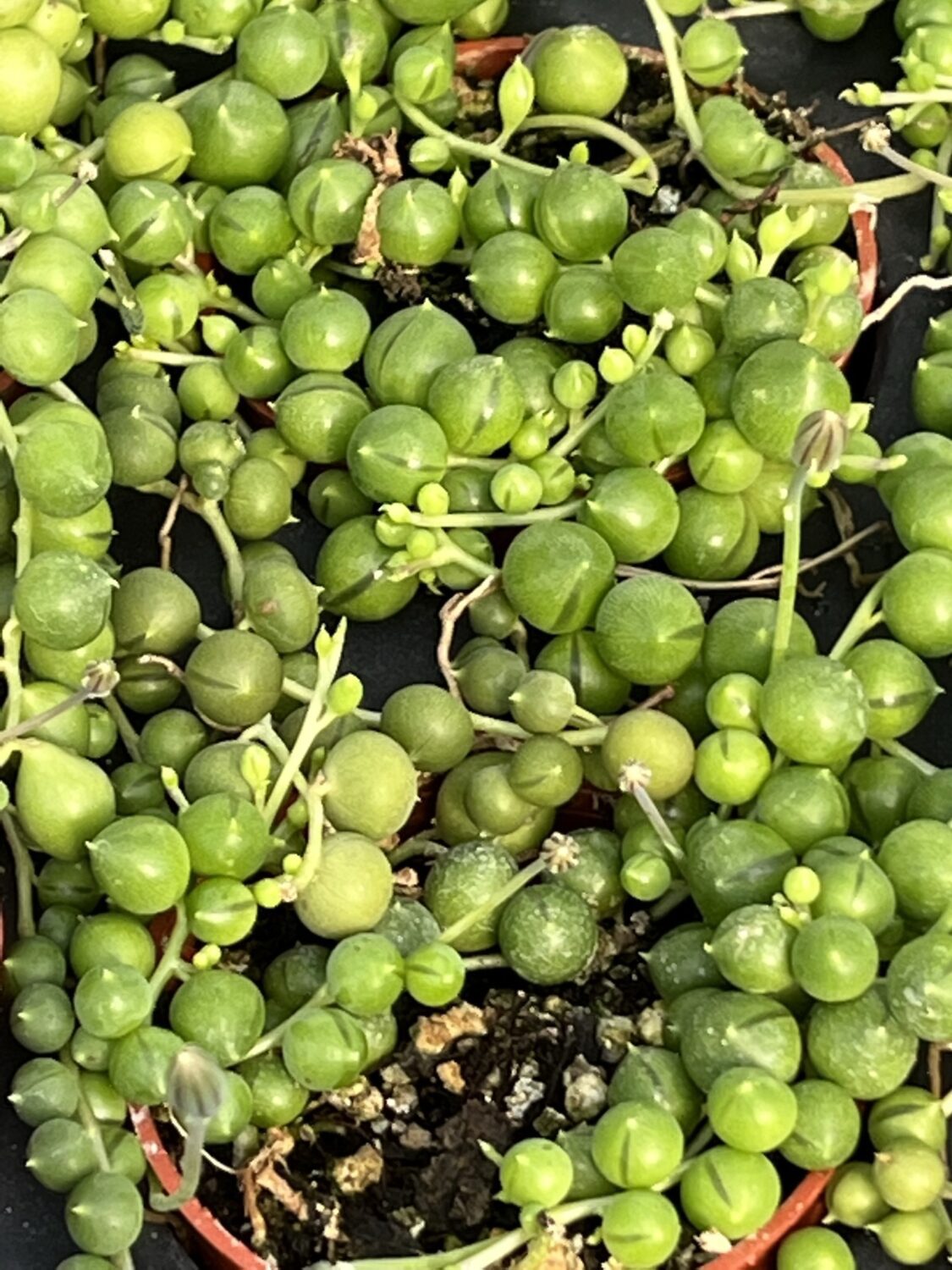Curio rowleyanus, String of Pearls
Price range: $5.99 through $24.99
Discount per quantity
| Quantity | 3 - 8 | 9 - 14 | 15+ |
|---|---|---|---|
| Price | Price range: $5.81 through $24.24 | Price range: $5.63 through $23.49 | Price range: $5.39 through $22.49 |
| % Discount | 3% | 6% | 10% |
Description
Curio rowleyanus (String of Pearls)
Curio rowleyanus, widely known as String of Pearls, is a beloved trailing succulent recognized for its whimsical, bead-like leaves. Each tiny sphere resembles a green pearl, giving this plant its charming name. Native to the dry regions of southwest Africa, this succulent is perfect for adding movement and texture to any space. Its cascading vines can trail up to 2–3 feet or more, making it a showstopper in hanging baskets, shelf displays, or as a trailing accent in mixed arrangements.
Beyond its playful look, String of Pearls is refreshingly low-maintenance. It thrives in bright light, tolerates dry conditions, and needs little attention, making it a favorite for both beginner and seasoned plant enthusiasts. With proper care, it may even surprise you with dainty, white, daisy-like flowers that carry a sweet cinnamon fragrance.
Features and Benefits
-
Eye-Catching Display: Round, pearl-like leaves create graceful, cascading vines.
-
Low Maintenance: Minimal watering and care needed; perfect for busy lifestyles.
-
Versatile Use: Ideal for hanging baskets, shelf edges, and mixed succulent gardens.
-
Fragrant Blooms: Produces delicate white flowers with a warm cinnamon scent.
-
Drought Tolerant: Naturally stores water in its leaves, perfect for dry conditions.
-
Air Purifying: Like many succulents, it can help freshen indoor air.
Specifications
-
Botanical Name: Curio rowleyanus
-
Common Names: String of Pearls, Rosary Vine
-
Height: 2–3 inches (not including trailing vines)
-
Trailing Length: 2–3 feet or longer
-
Sun Requirements: Bright, indirect light to partial sun
-
Soil Type: Well-draining sandy or cactus mix
-
Watering Needs: Low; allow soil to dry fully between waterings
-
Hardiness Zones: 9–12
Ideal For
-
Indoor hanging baskets
-
Shelf and windowsill displays
-
Succulent gardens and terrariums
-
Xeriscaping and drought-tolerant landscapes
How to Grow and Care for String of Pearls
1. Light
Place in bright, indirect light. Indoors, a south- or east-facing window works best. Outdoors, give partial sun and protect from harsh midday rays.
2. Soil
Use well-draining soil—a cactus or succulent mix works perfectly. Add sand, perlite, or pumice for extra drainage.
3. Watering
Water sparingly. Let the soil dry out completely before watering again. Overwatering can cause root rot; underwatering may lead to shriveled leaves.
4. Temperature and Humidity
Prefers 60–80°F (15–27°C). Not frost-tolerant—bring indoors if temperatures drop below 50°F (10°C). Low humidity is ideal.
5. Fertilizing
Feed monthly in spring and summer with a diluted cactus or succulent fertilizer. Skip feeding in fall and winter.
6. Pruning
Trim back leggy stems to maintain shape and encourage fuller growth. Remove any shriveled or dead pearls.
7. Propagation
Easily propagated by stem cuttings:
-
Take a 4–6 inch cutting
-
Let it callus for 1–2 days
-
Lay on well-draining soil and mist lightly until roots form
8. Repotting
Repot every 2–3 years or when roots outgrow the container. Handle gently to avoid damaging fragile stems.
9. Common Issues
-
Root Rot: From overwatering or poor drainage
-
Shriveled Leaves: From underwatering or prolonged drought
-
Leggy Growth: From insufficient light
Seasonal Tips
-
Water less during fall and winter dormancy
-
In spring, acclimate slowly if moving outdoors to avoid sunburn
-
Cooler nights in spring or fall may help trigger blooms
Design and Display Ideas
-
Showcase in hanging baskets to highlight its cascading pearls
-
Pair with upright succulents like Echeveria for contrast
-
Use in terrariums or fairy gardens for a whimsical effect
Why You’ll Love It
String of Pearls brings a playful, elegant vibe to any collection. Its trailing pearls add instant texture and movement, whether hanging in a window or spilling over a bookshelf. With minimal care and maximum charm, it’s a must-have for succulent lovers and décor enthusiasts alike.
Additional information
| Weight | N/A |
|---|---|
| Options | 2 in. (3 fl.oz.) Pot, 4 in. (16.9 fl. oz.) Pot, 6 in. Hanging Basket (1 qt) |





